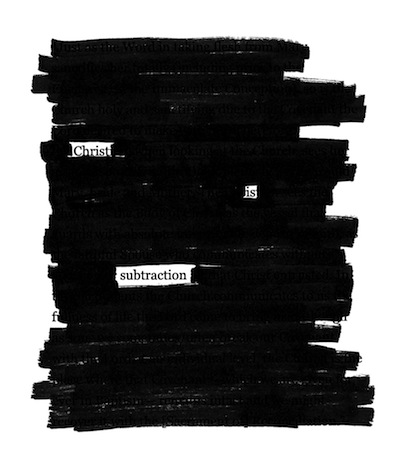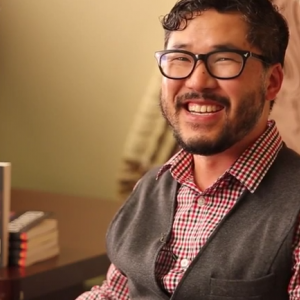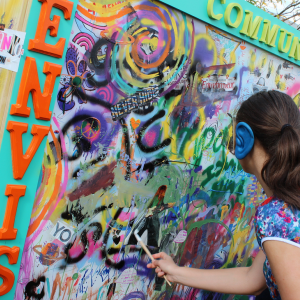
I'm deputy web editor for Sojourners, where I report on culture, tech, and religion, and look for voices to contribute to conversations on faith, spirituality, justice, innovation, and daily life. A collection of my reporting on sexual abuse and Christian communities, "I Believe You: Sexual Violence and the Church," was published in 2014 (avail on Amazon).
Beyond the religion beat, I also write on business, tech, community innovation, nostalgia, loss, collective memory, and war, with work appearing in the Atlantic, Pacific Standard, the Washington Post, Think Progress, and Books & Culture. In 2014, I spoke on collaborative solutions and "Do It Together" design models at SXSW in Austin, Texas.
My favorite postures are ethnographer and producer — reporting on the spread of subcultures, ideas, objects, and beliefs through time and place; and creating the conditions for others' voices and talents to thrive.
My nonofficial, not-so-subtle goal is to keep D.C. weird. Hold me to it.
Posts By This Author
Agree to Disagree: Millennials Talk Sex and Morals
When it comes to consensual sexual ethics among millennials, all behaviors are on the table … if the time is right. For the same generation in which no single religious group claims more than about one in 10, there is also little clear generational consensus on sex and reproductive health, a new report finds.
“Across seven behaviors related to sexuality [including: using contraception, sex between minors, unmarried cohabitation], there were no issues for which a majority pronounced them morally wrong in general,” the report, authored by Robert P. Jones and Daniel Cox at the Public Religion Research Institute, states.
Millennials prove a regular source of fascination for commentators and other millennials alike. This is the generation that launched a thousand think pieces, and understandably so — in study after study, millennials consistently defy both traditional categories and expected reactive categories alike. (We’re an obstinate bunch.)
When it comes to sex, PRRI’s new release highlights what its authors call “situationalist ethics” — a flexible set of acceptable behaviors. Far from displaying a lack of moral code, the report suggests millennials embracing nebulous but durable moral through-lines that eschew the “whats” of behavior for the “hows” and “whens.”
For example, in the case of sex between two adults who have no intention of establishing a relationship, millennials are evenly divided for and against (37 percent), with a significant number saying it depends on the situation (21 percent).
When it comes to abortion, most say it depends on the situation (39 percent), though more say it’s morally wrong than morally acceptable. Using artificial forms of birth control is by far the clearest point of agreement, with a full 71 percent saying it’s morally acceptable and another 14 percent depending on the situation — only 9 percent rejecting the use.
The report examines how our generation’s religious, racial, and political diversity is shaping attitudes, but it’s worth nothing how educational attainment is shaping moral frameworks, too. Much of the report’s findings reflect similar attitudes on broad categories across racial and religious lines, while noting some stark differences when broken down by educational attainment. (Not discussed in the report, but well-documented elsewhere — the crucial question of poverty and economic mobility when it comes to sexual norms.)
Faith Leaders Nationwide Call for Stay in Atlanta Woman's Execution, Scheduled Tonight
It is a great and terrible irony that our country’s correctional system does not often allow for or take much pride in perpetrators’ self-correction.
Yet to the degree that transformation within the system is possible, such appears to have happened for Kelly Gissendaner. The 46-year-old woman was sentenced to death for the 1998 murder of her then-husband, Doug. It is well-documented that her accomplice and then-boyfriend committed the act — he is sentenced to life, with a chance at parol.
Gissendaner faces excecution tonight at 7 p.m. EST.
If carried through, it will be the first time since 1976 that the state of Georgia will execute an individual who was not the person physically using violence in the crime.
Gissendaner’s case — that of a person guilty of murder whose profound internal transformation while in prison has led to a contemplative life of studying theology, mentoring at-risk youth, offering pastoral care to fellow inmates, and expressing full and sincere remorse for her actions — calls into stark question whether our criminal justice system, and specifically the state's use of the death penalty, honestly allows for the possibility for redemption.
Pastor Ousted Over LGBT Inclusion: 'There's So Much Grace'
Sojourners: What’s your hope for the ECC broadly? I’m not sure whether you can even speak to this yet, but are you hoping to stay within the denomination? What’s your hope for where this conversation leads the church?
Phillips: Well, I just, I deeply love the Covenant Church. I keep using “we” language instead of “us” and “them” language, because it really hasn’t sunk in yet. And there’s some confusion around, how do I operate as an ordained minister in a former Covenant church plant. For me, this all comes back to our Covenant pietistic roots about relationship, new life in Christ, and reading the bible together.
I’ve just met dozens and dozens and dozens of gay Covenanters in recent weeks that have said, hey, thanks for speaking up, and they’ve told me their stories of exclusion or being ostracized in some cases. These are good Christian people — people that grew up in the Covenant, working at Bible camps, going to Covenant schools. And some of these folks have experienced depression; some have experienced suicidal thoughts. And that’s the kind of thing that I hope that my friends in the Covenant, no matter where they stand on this matter, can work together to at least find some way for hospitality and inclusion to take place.
You know, I never thought that the Covenant needed to change its policies to become an open and affirming church. I was simply hoping that we could hold in tension this kind of historic covenant agreement to disagree on matters that weren’t what some would call “essential matters” — like resurrection, like new life, like the presence of the Holy Spirit. I have dear friends in the covenant that wouldn’t hold my position, and they’re doing amazing work in ministry — alongside the gay community, even — so you know, I hope that we can find some way forward that can get beyond this moment of confusion.
Sojourners: Many churches and Christian organizations in the U.S. right now are afraid to take a stand on LGBTQ rights precisely for this reason — whether it’s a hesitancy to break with denominational tradition or, maybe more pragmatically, a fear of getting defunded. For someone newly in this chaos, do you have any wisdom from having this happen to you?
Phillips: I think it’s imperative that we lean into what the Holy Spirit is doing. I think the Holy Spirit is guiding us on this conversation — and there’s so much grace. Even though there’s so much pain and fear. I think in the end, grace wins out.
I’ve found that in the midst of all this, amazing friends emerge, and new friendships are forged. And you know, God’s doing something really cool right now. And it seems chaotic, and it seems scary, because so many of the old models are outdated. But God’s truth is not changed whatsoever, and God’s news is still good. So I just encourage people to keep leaning into God’s promises and friends along the way that can walk with us as we figure it out as we go.
5 Apps for a ‘Closer Walk’
Religion writers get a lot of curious mail in their inbox. Our favorite this week was from Instapray, a social praying app.
Instapray does exactly what you'd think it would — matches communal prayer with the real-time get-it-anywhere nature of social media by allowing users to add, share, comment on, and update prayers. Like similar apps before it, there’s a spiritual motivation, too — users can mark that a prayer has been answered, or “repray” with others in solidarity of situation or spirit.
Most social prayer apps to date are some variation on Instapray, if less catchy/hokey in name — the Prayer Network, Ora, Intercede, Fellowshipper. Their thesis is clear — we often forget or don’t make time to pray; we don’t know who and what to pray for; we want to know our deep questions or petitions are being heard. (One also has to wonder whether the psychological pitfalls of digital social tools apply doubly when faith is involved — “What about all my prayers left publically unanswered? Why doesn’t anyone else share my prayer?".)
There’s a growing sense of partnership potential between Silicon Valley and faith communities, but the market for Christian social media to date remains largely untapped. It seems developers and faith leaders have yet to discover their collaborative sweet spot, where often-private religious inquiry best meets digital social tools. Instapray is one newer attempt at finding that nexus — success TBD.
In the meantime, here are 5 other Christian apps tooled to provide a closer walk with … well, each other.
Remembering J. Edward Guinan, Passionate Advocate for D.C.’s Most Vulnerable
Kathleen calls Ed’s lifework — which also includes authoring the 1979 D.C. statehood constitutional convention initiative and acting as Pax Christi USA’s first General Secretary beginning in 1972 — "a tiny seed that really sparked a lot of transformational education."
Kathleen mentions several former volunteers who went on to start their own hospitality houses, federations for organic farmers, prison rehabilitation initiatives, and food and poverty programs worldwide.
And the impact of Guinan’s work lives on in the city today. In 2008, Ed and Kathleen received the WETA Hometown Hero Award for residents working for "positive change for underprivileged people." The CCNV’s medical clinic has since grown into one of D.C.’s most recognizable service groups, Bread for the City. And according to the Washington Post, the CCNV’s Federal City Shelter still houses 1,350 beds — the country’s largest shelter for the homeless.
The Long Reconciliation: Iraq In the Time of ISIS
Elsewhere, Courtney describes the effect as recognizing the blood of your enemies physically pumping in your veins. It is a striking example of interdependence — physically and metaphysically.
Perhaps what’s spiritual is what’s biological. In the midst of the ongoing violence, Preemptive Love Coalition performed its 1,000th heart surgery last month.
November Sings the Blues
Late November is Vitamin D season. The dregs of the year threaten to swamp the spirit, clinging to each rough edge of the soul, and frequent shots of sunshine and warm coziness are needed just to keep the deep at bay. Each shadow left in the wake of autumn’s receding glory whispers, “Not yet.” And, “Not anymore.”
Next week the liturgical church celebrates Advent — the crown jewel of liminal spirituality. Advent is the thinnest place of Christian ritual, where material Today touches fingertips with spiritual Tomorrow. It looks forward while standing still, gently holding the embers of our souls, watching with hope for divine light and grace to set them aflame. Advent is gospel, singing, “The real story is yet to come.” Advent is the Now and the Not Yet.
But this week is for the Not Anymore. Today is for the blues.
Sojo Stories: OVERRATED
Eugene Cho is overrated.
At least that’s what he’ll tell you in his new book, Overrated: Are We More in Love with the Idea of Changing the World Than Actually Changing the World?
Cho, pastor at Quest Church in Seattleand founder of One Day’s Wages and Q Café, is an outspoken Christian voice for social justice. His first book is a self-professed confession of the risks of personal platform in the work of justice — and a call to humble self-awareness for Christians in an age of social change-idealism. When justice and changemaking are buzzwords, how do we embrace the long challenge of bettering the world while remaining humble about our place in it?
Watch the interview below.
5 Ways D.C. Is Actually Great (For People 'Meh' on National Politics)
Lonely Planet just ranked Washington, D.C., as the #1 Best Place to Travel in the world(!). Coming on the heels of Forbes crowning D.C. the coolest city in America in August, the admittedly unexpected parade of accolades appears to just be starting for the place Sojourners has called home for the past few decades.
Of course, “coolness” is elusive by nature — if it was measurable, it wouldn’t be cool — and the metrics used by both outlets are questionably desirable, if technically true for a portion of the city. Lonely Planet points to a city “whose official religion is national politics,” while Forbes lists “higher influxes of new people” and “most college degrees per capita.”
This shows a problematic tendency to weight Washington the industry over D.C. the city (this post from DCis toutlines that nicely). It also largely misses what’s actually great about this place. I’ve found D.C. to be far beyond the House of Cards-meets-Cherry Blossom Festival sketch beloved by press and many residents alike. In my daily experience, D.C. is collaborative, generous, and deserving of accolades in ways that continually surprise.
Based on my very unscientific metrics of personal observation and emotional investment, here are a few things that are uniquely great about D.C.
'It Couldn't Happen Among Christians!'
Even after the Ray Rice video, churches are in denial about sexual violence.
WHEN IT COMES to speaking out on sexual violence, the first barrier for pastors is awareness of the problem, according to a LifeWay poll, “Broken Silence.” Commissioned by Sojourners and IMA World Health, the poll—released in June—surveyed Protestant pastors across the United States on their views on sexual and domestic violence. That church leaders don’t often discuss sexual violence is not surprising; for perhaps the first time in the United States, the poll puts numbers to just how few actually do—and illuminates some reasons for the silence.
The lack of awareness of sexual violence is a multipronged problem. According to the poll, 74 percent of surveyed pastors underestimate the level of sexual violence experienced by members of their congregations. In part, this gap reflects a failure to understand the tragic ubiquity of sexual violence—1-in-3 women in the United States, and 1-in-4 men, will experience intimate partner violence in their lifetime. In a country in which 80 percent affiliate with religion, statistics strongly indicate that this issue is as pervasive within congregations as without.
Another problem, however, is around the willingness to believe it is happening. Of the pastors who talk about sexual violence, 72 percent do so because they believe it happens in their local community—but only 25 percent acknowledged that their own congregants may have experienced it.
“It couldn’t happen among Christians” is, sadly, a very common refrain among faith institutions. Reported instances of sexual abuse this year at Christian colleges, from Patrick Henry to Pensacola, indicate the deep costs of this refusal to ask whether sexual violence could happen “within the flock.”
The Strange Nostalgia of 'Left Behind'
Editor’s Note: ‘Left Behind’ starring Nicolas Cage hits theaters nationwide on Friday, Oct. 3. The film is based on the wildly popular book series and movies of the same title, in which God raptures believers and leaves unbelievers behind to learn follow Jesus and defeat the Antichrist. So how’s the film reboot?
Sojourners Web editors called up a group of religion writers in D.C. to watch and review the movie together. We left with more questions than answers. Here’s our takeaway on all things ‘Left Behind’ — and a little Nic Cage.
Catherine Woodiwiss, Associate Web Editor, Sojourners: So first things first — why Left Behind again?
When the books were published [starting in 1995], there was a debate happening in Christianity over whether Hell was a real, physical place. And the original movies were produced in the context of 9/11 and the Iraq war. So you can look and say, okay, this was a time of questioning what some saw as fundamental beliefs, of war and terrorism. So the popularity of an end-times series makes some sense.
But why now? Why today?
#WhyIStayed and #WhyILeft Show the Many Faces of Abuse
This week, the Baltimore Ravens terminated the contract of star runningback Ray Rice after video of Rice beating his then-fiancée Janay emerged online. Rice had previously been suspended for two games for the assault. With the release of the video, media scrutiny swiftly turned to his now-wife, speculating over why she would marry her abuser.
Beverly Gooden, a human resources manager and blogger, had a different response. Herself a survivor of domestic abuse, Gooden began tweeting of her own experiences, each one a vulnerable explanation: #WhyIStayed.
Gooden wrote, “I can't speak for Janay Rice, but I can speak for Beverly Gooden. Why did I stay? … Leaving was a process, not an event. And sometimes it takes awhile to navigate through the process. ...I hope those tweeting using #WhyIStayed find a voice, find love, find compassion, and find hope.”
We would all do well to listen. Some of the most powerful tweets below.
Top 10 Books — What We're Reading at Sojourners
We love the latest Facebook “book challenge" going around. It reads something like this:
"List 10 books that have stayed with you in some way. Don't over-think this — they don't have to be the 'right' books or great works of literature. Just books that have impacted you in some way."
We at Sojourners are a book-loving bunch, from religion and spirituality to politics; social justice to science; cultural history to historical fiction. Below are 10 favorite or most formative books from several staff here at Sojourners (in addition to books of the Bible, which could take several spots themselves).
See any of your favorites here? Which books do you most love? Share in the comments!
I Need Feminism Because ...
In a perfect world, women can choose to be whomever they want. But there is not yet a country on earth in which that is actually true. That is why we need feminism.
That there’s disagreement over how we talk about women’s empowerment in the U.S. isn’t surprising — feminism is a collection of unique people with unique visions of a good life, trying to figure out how to preserve past and present good, correct past and present wrongs, and forge a new way ahead together.
But it is tragically, perennially clear why speaking up against male-controlled narratives in church or school or novels or movies or business or government, against generations of excused behavior for men and oppression for women, against ongoing systemic injustice is still so crucially necessary.
From reading what these “anti-modern-feminists” have written, I don’t believe any of them would take umbrage with that. It’s a pity, then, they are rejecting the term feminism — their challenges would be great additions to the dialogue. More education and conversation about what feminism is, and how we do it, and where it can go, is clearly needed. Without it, I’m not at all sure how much farther forward we’ll be able to go.
Hack the Church
When introducing people to hacking, Ali Llewellyn often brings up Apollo 13. “Remember that scene where they dump everything on the table and say, ‘We have to  find a solution, with only these materials?’ And there’s, you know, duct tape? That’s all it is! Hacking is building a way to go from here to there.”
find a solution, with only these materials?’ And there’s, you know, duct tape? That’s all it is! Hacking is building a way to go from here to there.”
She should know. After studying church planting and social mobilization, Llewellyn went on to spearhead community engagement for NASA’s Open Innovation Program and is now a Senior Program Manager for SecondMuse, equipping hackers and non-hackers alike for the upcoming National Day of Civic Hacking.
Llewellyn’s dappled journey — from biblical scholarship to tech-minded collaboration — reveals a potent lens that Christians across denominations are using to repurpose, mobilize, and reform the church. In hacking, they see a model for the future of Christianity.
The term “hacking” has undergone a recent transformation in the popular lexicon, back to its amorally general origins as a method of discovery and recombination. For every Heartbleed-like scare today, there are innumerable cheery Buzzfeed tips to hack your life; and while the digital bandits of Anonymous capture our imagination, “hackathons” — community-oriented workshops to solve urban challenges — have popped up in many major cities.
With this broadened interpretation, Christian interest in hacking finds context. Just as faith systems give parameters to our spiritual imagination, so technology directs our inquiry into the universe and, increasingly, our connectedness to each other. Early Christianity spearheaded technological innovations with global ramifications, most notably in the invention of the codex. Today’s faithful hackers, armed with code, workshops, and participatory-minded theology, hope to do the same.
'I Want You To Want Me' — That Other Kind of Lust
Thought experiment: You are single. You’re eager for a sociable night out on the town. You step into a bar full of attractive people. You:
— See a hot someone across the room and think, I want to be all over him/her.
— See a hot someone across the room and think, I want him/her to think I am so appealing that they just want to be all over me.
Which one is lust?
The lust I heard about in church only ever dwelt on the first train of thought. This lust was an overwhelming desire for someone else, to the point of obsession, objectification, or infidelity. It was dirty, aggressive, mulled over in accountability groups and discussed in sermons of marriage and singleness. ... I didn’t relate to it at all.
In conversation with other close Christian women, I learned they didn’t really relate to it, either. We didn’t treat men or other women as objects of desire. We had hormones, sure, but they were … different. Sometimes we saw men as actively desirable, but not necessarily. We usually just wanted men to want us.
Sometimes we wanted them to want us really, really badly.
Sometimes we needed them to want us. Sometimes that was the only thing we could think about. Sometimes we’d fall into a prolonged pout if men who OBVIOUSLY SHOULD WANT US because we were HOT AND AWESOME, in fact, didn’t.
... Oh. Hmmm.
*Lightbulb*
Is it possible that lust works in multiple ways? Is it possible that the all-consuming desire to be desired is just as lustful as the all-consuming desire to have?
'... And You Can, Too!' Greed and Every Possible Possibility
The first sign I had a problem was when I came across Candy Chang’s “Confessions” project in 2012. It was an interactive art installment on the Las Vegas strip that invited people to come in and confess their deepest secrets anonymously. Those secrets would then be added to a visual art display. It was engaging, unexpected, relevant, discussion-provoking. It was fun.
I hated it.
More correctly, I loved it; and hated myself for not actively doing something similar. I wondered how to implement a version of this idea among colleagues and in office hallways of my organization at the time; I considered “art-bombing” the streets of my city with thought-provoking questions; I spent several moments over the next several weeks seriously questioning whether I should drop everything to focus on Chang-style installations, because I could, and I liked it, and it would work, so I should be doing it. Nothing else I was currently doing mattered. Not without this one thing more.
Welcome to an exhaustive (and exhausting) self-talk: the fixation on never doing enough. Until very recently, I thought this way almost all the time. Somehow — accidentally, almost imperceptibly — years of nurturing my professional and creative pursuits was nurturing something else, as well. It became nearly impossible for me to see work that I admired and appreciated and to not simultaneously think, “I should be doing that, too.”
Which is, simply put, raging covetousness.
Seven Deadly Sins: A Playlist
Wrath
Rolling in the Deep — Adele
Mama Said Knock You Out — LL Cool J
Sloth
Lazy Song — Bruno Mars
Je Ne Veux Pas Travailler — Pink Martini
Greed
Rich Girl — Gwen Stefani ft Eve
I Want It All — Queen
Gluttony
Eat It — Weird Al Yankovich
Can’t Stop — Miley Cyrus
Lust
I Want You to Want Me — Letters to Cleo/10 Things I Hate About You soundtrack
I’m Sexy and I Know It — LMFAO
Pride
I’m the Best (clean version) — Nicki Minaj
Devil Went Down To Georgia — Charlie Daniels Band
Envy
Jessie’s Girl — Rick Springfield
Dancing on My Own — Robyn
Art, Liturgy, and the Future of Music: A Q&A With Gungor
Editor's Note: Last week, Sojourners’ Associate Web Editor Catherine Woodiwiss caught up with musical collective Gungor at South by Southwest in Austin, Texas. Here’s what Michael Gungor has to say about art, liturgy, and the future of music.
This interview has been edited for length and content.
Catherine: So what brings you to South by Southwest (SXSW)?
Gungor: I guess we thought it was about time to experience the circus.
Catherine: A couple of years ago there was talk of SXSW becoming a destination for "Christian techies,” and Donald Miller premiered his popular film, Blue Like Jazz, at the film portion of the festival. Do you consider yourself part of a Christian “witness” here at SXSW?
Gungor: We are here to make some music, have a good time, and perhaps make some friends along the way. We certainly aren't here to proselytize or advance some secret religious message or anything.
But anywhere we go, we do have a desire to live the sort of life that Jesus invited people to live.
Social Justice Pick-Up Lines
I didn’t expect to get hit on during Super Bowl XLVIII.
I mean, I was expecting the usual stuff — the testosterone-fueled web hosting pitch, the adorable animals selling beer – but this was shameless. Someone really did their homework, because company after company turned up with things I like to hear: healthy families; cute biracial kids; a nation of immigrants; a thriving main street; victory for the marginalized; solving the world’s most pressing social ills. Check, check-check.
Progressive values, you are currently the it-girl for advertisement pickup artists. Enjoy it?
I, for one, do not.
Don’t get me wrong, commercials that celebrate our society as diverse and affirming are far more appealing than the advertising tropes we’re used to. But they also veil or flat-out misrepresent the structures and practices of the companies telling them. Without a significant shift towards justice on the part of these companies themselves, their social good stories shouldn’t charm us — they probably should leave us with a bad taste in our mouths.















